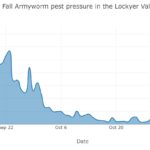Managing on-farm biosecurity risks in wet weather events
14 November 2024
Daily updates on fall armyworm activity
19 November 2024Digital remote monitoring was assessed as a method of improving the environmental performance of Australian horticulture. The development of a farm management tool, called Control Tower aimed to improve environmental compliance and productivity by facilitating industry best practice. Four pilot smart farms were established in Great Barrier Reef catchments to demonstrate the benefits of digital remote monitoring and the Control Tower. These pilot smart farms were selected from the banana, nursery, avocado and vegetable industries.
A framework for the digital remote monitoring of environmental performance was developed in consultation with each of the target industries. Industry feedback overwhelmingly recommended using digital remote monitoring to simplify compliance with best practice. Existing environmental sustainability frameworks for horticulture were adapted for digital remote monitoring. The resulting environmental sustainability framework for horticulture was integrated into the Control Tower.
The collection of compliance information by the Control Tower allowed the project to facilitate a remote audit at the banana pilot farm. The Control Tower provided additional value to certification records by combining chemical application data with the GPS location of farm vehicles. The collection of this data enabled an auditor to access the Control Tower remotely and verify key certification records. The success of this remote audit demonstrates significant progress in lowering the barries to environmental compliance and proved that rigorous audits can conducted remotely.
The Control Tower was developed as a combined productivity and environmental monitoring tool. Integrated with sensors from multiple technology providers, the Control Tower is a sensor agnostic farm management system. All pilot farms were installed with soil moisture, plant growth and weather monitoring equipment. The presentation of multiple sources of plant stress data to the growers led to improved water use efficiency and reduced labour requirements.
Innovative technological solutions were developed for the pilot farms and their associated industries. Comprehensive water monitoring equipment was installed at the smart production nursery. The quality of water entering and exiting the nursery was monitored and used to automate digital records.
A nitrate monitoring system was deployed to measure subsurface leachate at the banana pilot farm. The data from this system was used to develop a nutrient loss prediction model, providing growers with decision support. Forecasting nitrate runoff and leaching, allowing growers to adjust their practices and minimise negative environmental impacts.
Applied Horticultural Research led the communication and extension of the benefits of digital remote monitoring for environmental performance. The project was showcased at multiple conferences, through presentations, posters, and workshops. The benefits of the project were communicated through webinars, factsheets, case studies, guides, and interviews.
The project was delivered by Hort Innovation, Applied Horticultural Research, Hitachi Vantara, Greenlife Industry Australia, AUSVEG, Avocados Australia Limited, Landcare Australia, Freshcare, Growcom and the Australian Banana Growers’ Council.
The project conclusively demonstrated that digital sensors and technology can be used to efficiently manage environmental performance and prove compliance with industry best practice. Digital remote monitoring reduced costs, improved input efficiency and opened new sustainable markets for Australian horticulture.
